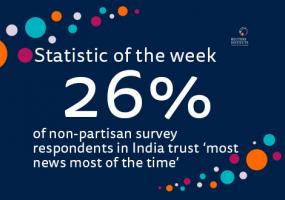Media policymakers obsess over market share
03 Oct 2011
Robert Picard writes: Policymakers are increasingly infusing media policy with competition law overtones and language. They are particularly obsessed with the media market share concept. Many seem to start from the position that any large market share is a dire threat for democracy. Market share indicates the amount of overall audience or advertising expenditures accounted for by one company, for example, Trinity Mirror or the BBC. This approach is being used in policy decisions for both commercial and public service media. It skews perceptions about the underlying purposes of media policy and makes it difficult for society to deal with issues of universal service, small communities and minorities, pluralism, and provision of less profitable content. Media policy is industry-specific, designed to create and nurture a media environment that supports the domestic information needs of the public, supports domestic culture and identity, and facilitates social, political, and economic activities. Although media policy should not be widely at odds with other policy, various national policies serve different purposes and they must be balanced to achieve optimum outcomes. Consequently media, cultural, competition, and industrial policy are rarely perfectly aligned. Industrial policy may promote domestic media industries and employment whilst competition policy may promote foreign company entry and free trade in media products. Cultural policy may promote domestic cultural products whilst competition policy promotes importation of less expensive imported cultural products. Media policy may promote public service media to ensure pluralism and serve citizens throughout the entire country whilst competition policy may promote commercial media that are primarily interested in urban areas and wealthier audiences. When those concerned about media developments focus merely on market share, they do a disservice to the public. Even in competition law and economics, market share is not definitive. It is merely an indicator of the potential for market power to be used to stifle competition. It is not the problem itself, but an indicator that additional questions need to be asked about problems it may portend. Competition law, for example, does not seek to punish firms that provide better products or services that are preferred by the public by forcing the companies to provide poorer products to lose market share. This is because merely gaining a large market share is not evidence of bad behaviour. Undesirable behaviour only becomes evident if the firm seeks to increase its already dominant market share through mergers or acquisitions or by actively exercising its market power to the specific detriment of competitors. When policymakers identify high market share in a media provider, they should monitor it and consider possible negative and positive impacts. They should question how the market power is being exercised, whether its purpose is to enrich owners or society, whether the media is partisan or dedicated to pursuing pluralism, and whether there are effective internal oversight functions to ensure fairness and accuracy and respond to complaints. Answers to these kinds of questions provide a more holistic view of the potential impact and perils of high market share and will give policymakers a much firmer basis for making decisions to ensure that the public and society as a whole have a beneficial media system in place.




